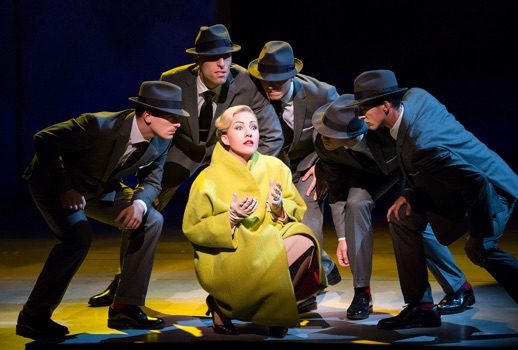

A riddle, inside a mystery, wrapped in cashmere.
It’s a common criticism of Manon Lescaut , whether in the hands of Massenet or Puccini, that it’s hard to feel a lot of sympathy for the heroine in the light of her actions. How much harder, then, is the task Nico Muhly has set himself in presenting Winston Graham’s elusive heroine Marnie (and this is very definitely an adaptation of Graham,not Hitchcock) on the operatic stage?
As a character Marnie makes Manon look like Mimi. It’s not just that she’s a serial thief and embezzler, it’s that she is deliberately inscrutable and places as many barriers as she can between herself and the rest of the world. If Muhly doesn’t quite succeed in making us root for her, the two of them do more or less manage to keep us guessing over the course of an intriguing evening.
This is Muhly’s second world premiere presented at ENO in collaboration with the Met—it will be seen there next year. Like the previous work, Two Boys, it is directed by a beloved Parterre favourite: Bartlett Sher for the previous opera, Michael Mayer for this one. Presumably Muhly’s next work will be directed by a triumvirate of Mary Zimmermann, David McVicar and Jeremy Sams.
However, just as Sher’s work on Two Boys was one of the most consistently excellent elements of the evening, so does Mayer’s work prove here. On Julian Crouch’s truly beautiful (and beautifully practical) set of sliding screens, the action flows with a seamless, inexorable grace.
The set is the first truly successful use of projection I’ve seen on stage, either at the theatre or the opera. This is partly because it addresses the dilemma of whether projections should be figurative or symbolic by airily sidestepping the issue.
Sometimes the projections are there to give us a defined location—a pub, a country club—while at others they’re more suggestive, so that the office is represented by images of files, folders and the timetable for the train Marnie organizes for Mark, and rather than the inside of a cruise ship stateroom we get an image of the outside of a ship on shimmering waves.
The curtain rises on a kind of dreich British version of How To Succeed In Business Without Really Trying. Chattering woodwind underscores choral admin as Marnie and her colleagues file invoices and generally Get The Paperwork Done. It’s our first reminder of something Two Boys made very clear—that Muhly writes magnificently for a chorus.
He made clear in interviews his desire to showcase the ENO’s strength in that regard and throughout the evening succeeds triumphantly. An early, oratorio-like musing on the meaning of guilt is a particularly effective, haunting piece of writing, with counterpoint from the four alter-egos who periodically join the heroine to illustrate her state of mind.
That heroine is Sasha Cooke, gloriously rich of voice and a detailed, nuanced actor. She’s barely off stage in this monster of a part. But right from the start she’s battling the stakes. For a long time we seem to be expected to care about Marnie without knowing why we should.
She has linking arias between scenes where she reveals a little of herself—but it’s always on the character’s terms. There’s never a sense that the audience has been let in on something she didn’t want us to know. Marnie’s control over how she is perceived by those around her is echoed by the rigid control she exerts over what she allows us to see.

But Lulu is easier to get a handle on. Her endgame is survival and her currency is sex. What Marnie is aiming for is less clear, and what she’s selling is mystery, all of which makes her a difficult proposition as a heroine. And Berg makes Lulu stratospherically extraordinary: we know from her music why people are drawn to her.
The music Muhly gives Marnie, on the other hand, while endlessly inventive and often beautiful, is cool, glacial, measured—three qualities that don’t immediately spring to mind when the word “opera” is mentioned. So the score, while it can dazzle orchestrally and chorally (he manages to bring to mind Britten, Stravinsky, Berg, even Reich, but always within a musical language entirely his own) becomes less compelling in the mouth of his heroine.
At times we hear shreds of something really fascinating, however. When Mark catches Marnie on the rob and she realizes she is about to be coerced into marriage, she suddenly skitters around the stave in panicked near-coloratura, a mini mad scene which leaves us aching to know more about what happens to this woman when her guard is down.
And while Muhly and his librettist, Nicholas Wright, rightly strip back some of the queasier sexual politics that Hitchcock’s film layered onto Graham’s book, the work isn’t quite the feminist statement it feels as if they want to make. Marnie’s thefts and embezzlements turn out to be based in something far more personal than a response to the patriarchy, and the villain of the piece turns out to be not that patriarchy, or even the husband who blackmails her into marriage then attempts to rape her, but… another woman.
While we’re on gender, it’s worth mentioning that the audience seemed to be at least 80% male. I’ve not been in a room so overwhelmingly full of men since, well, the last room full of men I was in, which is none of your business. This may be an opera which addresses the male gaze, but it was largely watched by the male gays.
And the male characters, Daniel Okulitch’s Mark in particular, don’t seem to have interested Muhly as much as the female ones. Okulitch doesn’t do anything wrong, but Mark is never a character that leaps off the stage, whether mourning his dead wife, attempting rape or offering reconciliation. James Laing is creepy, engaging and redemptive as required in the role of the brother Terry, but this too feels as if it could have been a more layered character than the one we see.
The women come across much more vividly. Diana Montague radiates heartbreaking quiet goodness as Lucy, and really makes the most of her role in the opera’s big reveal. As Marnie’s mother, Kathleen Wilkinson is balefully judgemental in chest voice and a wheelchair.

The voice, never the greatest instrument, is nonetheless in very good nick indeed and she gave a flawlessly acted portrayal of Mark’s mother, surely destined to become a favoured late-career cameo for sopranos. In fact, with its imperious personality, jagged vocal line, white wig, straight back, and hint of something more sympathetic lurking somewhere deep underneath, it felt as if Anja Silja has already played it.
This opera represents a significant development from Two Boys. It’s much more at home with its dramatic structure (building to a really shocking first act curtain) and musically, too, there’s a real sense of a composer becoming at home with the medium. Those alter egos, in clashing ecclesiastical harmonies (absolutely glorious work in particular from soprano Charlotte Beament, seemingly always on the verge of launching into That Phrase from the Allegri Miserere) were an especially inspired touch.
Its flaws lie not so much in the writing of the libretto or the composing of the score, but in the fact that they don’t always coalesce into something dramatically satisfying. At times it really is hard to avoid thinking “why am I being made to spend time with these awful people?” And even in moments intended to be more sympathetic—the beautiful aria Marnie has about her love for her horse, for example—that emotional deficit is still in play. “I’m working really hard to care about you,” one can’t help thinking, “so please don’t invite me to care about your livestock too”.
Nonetheless, if it’s sometimes a detached evening, or a frustrating one, it’s never ever boring. The lowest point was reached for me in what should have been its climax, a botched representation of the crucial hunting accident which falls into the trap of telling not showing (we, understandably, don’t see any horses or foxes, but Marnie’s “here’s what’s happening now” isn’t really a solution when what we’re looking for is a theatrical coup, not a managed difficulty).
But the last twenty minutes of the opera—Terry’s determination to free Marnie from her lies, Mark’s mother at his hospital bed, Marnie’s sudden inability to steal, Lucy’s intervention and Marnie’s ultimate liberation from her past and herself—were musically riveting and, finally, very moving.
The calmness of the musical language Muhly had created for Marnie paid off handsomely in those final movements. Her realization of what she had been, and that she didn’t need to be it any more, was all the more affecting for its restraint. Her freedom was something she greeted not with manic joy, but with an austere, regretful optimism and I may have had something in my eye.
It should be noted that Muhly’s appearance at the curtain call was greeted with a stadium-sized cheer, a touch of Muhlymania. This man has a fanbase, maybe even a fandom, and that’s exactly what contemporary opera needs. Well, it’s one of the things, anyway.
And for all the creases in this particular work, it’s a fandom he deserves. The score is brimming with confidence and seriousness and enthusiasm. It’s a work which, like its predecessor, is always intelligent and engaging even at moments that don’t feel fully realized. I hope—and expect—that Marnie is Muhly’s Idomeneo or Nabucco or, yes, even his Manon Lescaut; the work that says “Look what I can already do. Just you wait to be blown away by what I do next.”
Photos: Richard Hubert Smith


























Comments